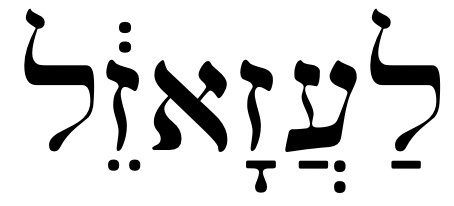SCAPEGOAT, AZAZEL, AND THE ATONEMENT
March 20, 2023 2024-05-10 13:09SCAPEGOAT, AZAZEL, AND THE ATONEMENT
In a world of injustice, sometimes innocent people are blamed and punished for crimes they didn’t commit. What’s worse, sometimes they’re chosen as scapegoats by the wrongdoers themselves. But why do we call the victims “scapegoats” if they escaped nothing? The original concept of the word is actually supposed to be a good thing.
Az-azel: the “goat that goes (away)”
Taken from Hebrew עז (’ez) for “goat” and the Hebrew-Aramaic root אזל (‘azal) for “going (away),” this name has a fairly literal meaning behind it. But still it’s mysterious, sounding like a personal name in all 4 occurrences we have of it in our Bibles. In Leviticus 16 we find the two sons of Aaron dead after offering “strange fire” that God did not accept. It was clear that they didn’t take their roles as priests very seriously, so God instructs Aaron on how to make proper atonement for himself and the people of Israel.

First, he has to sacrifice a bull as a “sin offering”–sometimes known as a “purification offering”–for himself and his household. Then, he take two young goats: one will be sacrificed to the LORD as a sin offering for the people, and the other will be sent away “into the wilderness, to Azazel.”
Is Azazel an angel or a demon?
Is there someone named “Azazel” that’s supposed to get this goat? Plenty of ancient Israelites thought so, and by the Second Temple period we find Jewish literature flooded with stories of angels and demons where the head demon’s name is often Azazel. In fact, the infamous personality built around this name is so hideously evil that it has become a common curse in modern Hebrew (like how we often use “Hell” in English). But it’s not clear from Leviticus 16 that God had a rival deity in mind, to whom the Israelites were supposed to send a gift. In fact, if that’s what’s happening, then we may have a problem with Israelite monotheism. What are they doing, offering anything to a god-like being that isn’t YHWH?
The twist is that it wasn’t a gift. Before sending the goat away, Aaron is instructed to lay his hands on its head and proclaim over it the iniquities of all the people of Israel, for whom he’d just made atonement with the blood of the first goat. Then he sends the scapegoat away to the wilderness, bearing these iniquities.
This ritual has striking parallels among Hittites and Philistines, who also practiced transferring bad things (plagues, guilt, and misfortune) onto other people, animals, and objects, then sending them away for self-protection.
What did this mean for Israel?

For the Israelites, though, there’s another element at play. They’re not simply appeasing an angry God or pinning their own punishments on an innocent victim: they’re readying themselves to meet their holy God in His Holy Tabernacle, preparing themselves and their space for Him.

Would you like to hear more about Azazel, atonement, and theories about the meaning of “scapegoat”? Listen to our full podcast episode here.
Would you like to receive more exclusive content from Pillar Seminary? Click here to receive content from Pillar’s faculty and stay up to date with what’s going on at Pillar Seminary via email.
This blog post is based on an episode of the Pillar Podcast featuring Dr. Scott Booth, Dr. Eric Smith, and Dr. Dan Lowery entitled “Scapegoat, Azazel, and the Atonement.” It was summarized and edited by Philip T. Morrow.
Related Posts
LUNCHTIME SEMINARY ON ACTS (FALL 2023)
JUDGING LIVES AND SEALING FATES IN THE HEBREW BIBLE
WHAT DO WE MEAN BY “TORAH”?
EASTER: THE BEGINNING OF THE STORY
WAS JESUS IN THE OLD TESTAMENT?
Search
Popular Tags





